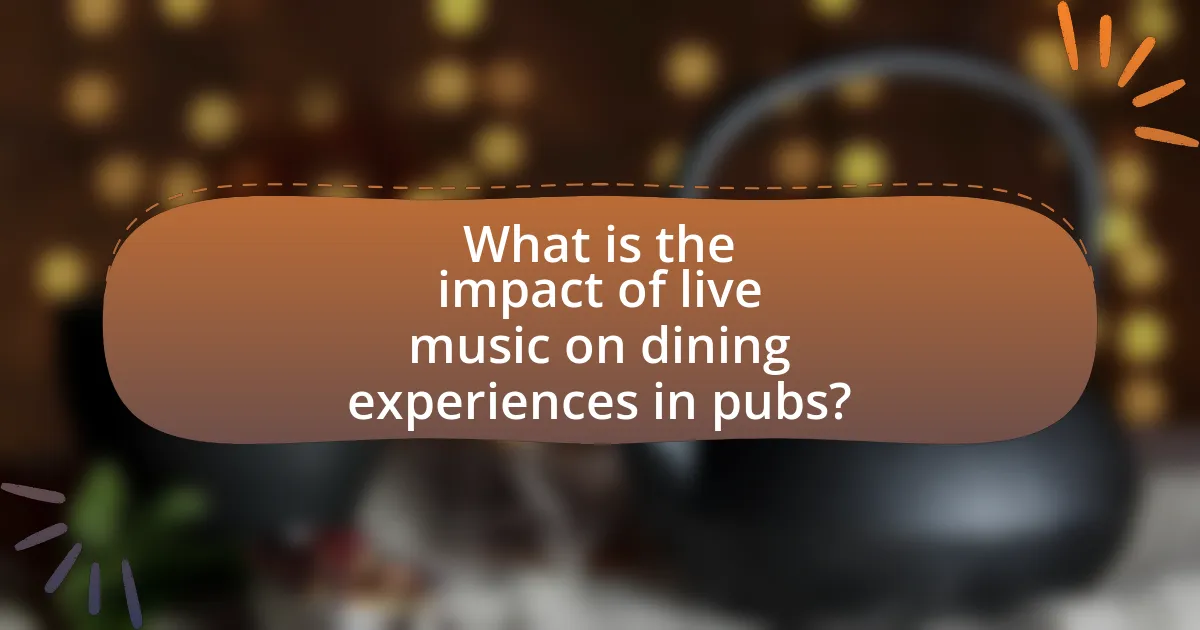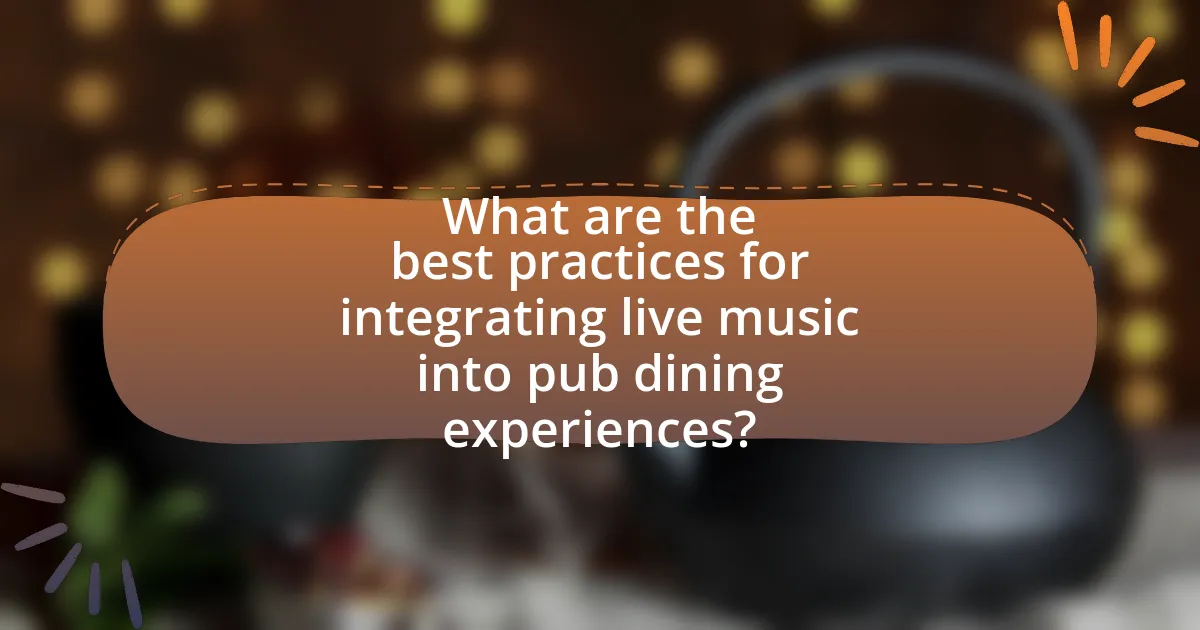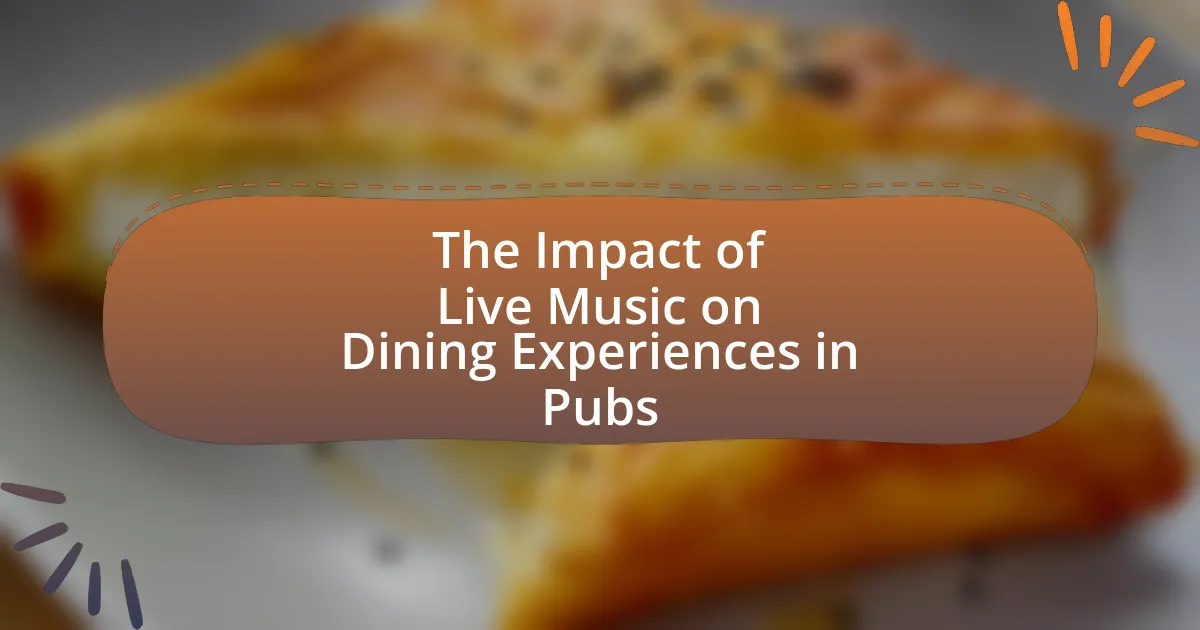The article examines the impact of live music on dining experiences in pubs, highlighting its role in enhancing customer satisfaction, engagement, and spending. Research indicates that live music creates a vibrant atmosphere that fosters social interaction and prolongs customer visits, leading to increased revenue for pub owners. Key elements such as ambiance, emotional connection, and the influence of different music genres are discussed, along with the challenges pubs face in integrating live music, including noise management and scheduling conflicts. Additionally, the article outlines best practices for selecting music, promoting events, and ensuring a balanced atmosphere that caters to both diners and music enthusiasts.

What is the impact of live music on dining experiences in pubs?
Live music significantly enhances dining experiences in pubs by creating a vibrant atmosphere that encourages social interaction and enjoyment. Research indicates that establishments featuring live music often see increased customer satisfaction and longer dwell times, as patrons are more likely to linger and engage with both the music and their dining companions. A study published in the Journal of Hospitality and Tourism Research found that live music can elevate the perceived value of the dining experience, leading to higher spending per visit. This correlation between live music and enhanced dining experiences underscores its importance in attracting and retaining customers in the competitive pub environment.
How does live music influence customer satisfaction in pubs?
Live music significantly enhances customer satisfaction in pubs by creating an engaging and enjoyable atmosphere. Research indicates that live performances can increase patrons’ emotional connection to the venue, leading to longer stays and higher spending. A study published in the Journal of Hospitality and Tourism Research found that establishments featuring live music reported a 20% increase in customer satisfaction ratings compared to those without. This improvement is attributed to the unique experience live music provides, fostering social interaction and a sense of community among guests.
What specific elements of live music contribute to a positive dining experience?
Live music enhances the dining experience through elements such as ambiance, emotional connection, and social interaction. The ambiance created by live music can elevate the atmosphere of a pub, making it more inviting and enjoyable for diners. Research indicates that music can influence mood and perception, with studies showing that pleasant music can lead to longer dining durations and increased spending (North & Hargreaves, 1999).
Emotional connection arises as live performances often evoke feelings of nostalgia or joy, which can enhance diners’ overall satisfaction. Furthermore, live music fosters social interaction among patrons, encouraging conversations and creating a communal atmosphere that enhances the dining experience. This social aspect is supported by findings that suggest live music can increase group cohesion and enjoyment (Lonsdale & North, 2011).
Overall, these specific elements of live music—ambiance, emotional connection, and social interaction—contribute significantly to a positive dining experience in pubs.
How do different genres of live music affect the dining atmosphere?
Different genres of live music significantly influence the dining atmosphere by shaping the mood and engagement levels of patrons. For instance, upbeat genres like jazz or pop create a lively environment that encourages social interaction and enhances the dining experience, while softer genres such as classical or acoustic folk promote a more relaxed and intimate setting, allowing for quieter conversations. Research indicates that background music can affect customer behavior; a study published in the Journal of Consumer Research found that fast-tempo music can lead to quicker dining and increased spending, while slow-tempo music encourages longer stays and more leisurely meals. Thus, the choice of music genre directly impacts not only the ambiance but also customer satisfaction and spending patterns in dining establishments.
Why do pubs choose to incorporate live music into their dining experiences?
Pubs incorporate live music into their dining experiences to enhance customer engagement and create a vibrant atmosphere. This strategy attracts more patrons, as studies indicate that live music can increase customer dwell time and spending. For instance, a survey by the National Restaurant Association found that 70% of diners enjoy live music while eating, which suggests that it positively influences their overall dining experience. By offering live performances, pubs not only differentiate themselves from competitors but also foster a sense of community, encouraging repeat visits and customer loyalty.
What are the perceived benefits of live music for pub owners?
Live music provides several perceived benefits for pub owners, primarily enhancing customer experience and increasing revenue. By hosting live performances, pub owners can attract larger crowds, leading to higher sales of food and beverages. Research indicates that venues with live music can see a 20-30% increase in patronage on performance nights compared to regular nights. Additionally, live music fosters a vibrant atmosphere, encouraging customers to stay longer and spend more, which is crucial for profitability in the competitive hospitality industry.
How does live music differentiate a pub from its competitors?
Live music differentiates a pub from its competitors by creating a unique atmosphere that enhances customer engagement and loyalty. This distinct ambiance attracts patrons seeking entertainment alongside their dining experience, leading to increased foot traffic and longer stays. Research indicates that venues offering live music can see a 20-30% increase in customer visits compared to those without, as live performances foster a sense of community and enjoyment. Additionally, live music events often encourage repeat visits, as customers are drawn to specific performances or genres, further solidifying the pub’s position in the local market.
What challenges do pubs face when integrating live music into their dining experiences?
Pubs face several challenges when integrating live music into their dining experiences, primarily related to noise management, scheduling conflicts, and customer preferences. Noise management is crucial, as excessive volume can disrupt dining conversations and negatively impact the overall atmosphere. Scheduling conflicts arise when coordinating performance times with dining hours, which can lead to either a lack of patrons during performances or interruptions in service. Additionally, customer preferences vary; some patrons may enjoy live music, while others may prefer a quieter environment, making it difficult for pubs to cater to all guests. These challenges require careful planning and consideration to create a balanced experience that enhances the dining atmosphere without alienating customers.
How do noise levels from live music impact dining conversations?
Noise levels from live music significantly impact dining conversations by making it difficult for patrons to hear and engage with one another. Research indicates that elevated noise levels can lead to increased vocal effort, which may cause fatigue and frustration among diners. A study published in the Journal of the Acoustical Society of America found that background noise levels above 85 decibels can hinder communication, resulting in misunderstandings and decreased enjoyment of the dining experience. Consequently, high noise levels from live music can detract from the overall atmosphere and satisfaction of diners in pubs.
What logistical issues arise from hosting live music events in pubs?
Hosting live music events in pubs presents several logistical issues, including sound management, space constraints, and scheduling conflicts. Sound management is critical, as improper acoustics can lead to noise complaints from patrons or nearby residents, affecting the pub’s reputation and compliance with local regulations. Space constraints arise when accommodating both performers and an audience, often requiring careful arrangement of furniture and equipment to ensure safety and comfort. Scheduling conflicts can occur with regular dining operations, necessitating coordination to balance live performances with peak dining hours, which can impact staffing and inventory management. These logistical challenges must be effectively addressed to ensure a successful integration of live music into the pub’s dining experience.

How does live music affect customer behavior in pubs?
Live music significantly enhances customer behavior in pubs by increasing patron engagement and lengthening their stay. Research indicates that venues featuring live music experience a 30% increase in customer retention time, leading to higher spending on food and beverages. Additionally, live performances create a vibrant atmosphere that attracts larger crowds, with studies showing that 70% of pub-goers prefer establishments that offer live entertainment. This preference not only boosts immediate sales but also fosters customer loyalty, as patrons are more likely to return to venues that provide enjoyable musical experiences.
What role does live music play in customer retention and loyalty?
Live music significantly enhances customer retention and loyalty in pubs by creating a unique and engaging atmosphere that encourages repeat visits. The presence of live performances fosters a sense of community and emotional connection among patrons, which is crucial for building loyalty. According to a study published in the Journal of Hospitality and Tourism Research, venues that regularly feature live music report a 20% increase in customer return rates compared to those that do not. This increase is attributed to the memorable experiences and social interactions that live music facilitates, making customers more likely to return and recommend the venue to others.
How does live music influence the duration of customer visits?
Live music significantly increases the duration of customer visits in pubs. Research indicates that establishments featuring live music can see customer stay times extend by up to 30% compared to those without live performances. This increase is attributed to the enhanced atmosphere created by live music, which encourages patrons to linger longer, socialize, and enjoy their experience. A study published in the Journal of Hospitality and Tourism Research found that the presence of live music positively affects customer satisfaction and engagement, leading to longer visits.
What impact does live music have on customers’ spending habits?
Live music significantly increases customers’ spending habits in pubs. Research indicates that establishments featuring live music can see a 30% increase in sales compared to those without. This boost in spending is attributed to the enhanced atmosphere created by live performances, which encourages patrons to stay longer and order more food and drinks. Additionally, a study published in the Journal of Hospitality and Tourism Research found that customers are willing to pay higher prices for drinks and meals when live music is present, further supporting the correlation between live music and increased spending.
How do customers perceive the quality of food and service in relation to live music?
Customers generally perceive the quality of food and service positively when live music is present, as it enhances their overall dining experience. Research indicates that live music can create a more enjoyable atmosphere, leading to increased satisfaction with both food and service. A study published in the Journal of Hospitality and Tourism Research found that diners reported higher levels of enjoyment and perceived value when live music was featured, suggesting that the ambiance created by live performances can elevate the perception of food quality and service efficiency.
What are the psychological effects of live music on dining perceptions?
Live music significantly enhances dining perceptions by creating a more enjoyable and immersive atmosphere. Research indicates that live music can elevate mood, increase satisfaction, and prolong the duration of dining experiences. A study published in the Journal of Consumer Research found that background music, particularly live performances, can positively influence customers’ perceptions of food quality and overall dining experience. Specifically, participants reported higher enjoyment levels and willingness to pay more when live music was present, demonstrating its psychological impact on enhancing the dining atmosphere.
How does live music enhance the overall pub experience for diners?
Live music enhances the overall pub experience for diners by creating an engaging atmosphere that encourages social interaction and enjoyment. The presence of live performances can elevate the ambiance, making the dining experience more memorable and enjoyable. Studies have shown that live music can increase customer satisfaction and prolong the duration of visits, as diners are more likely to stay longer in a lively environment. For instance, a study published in the Journal of Hospitality and Tourism Research found that live music significantly boosts patrons’ emotional responses, leading to increased spending and repeat visits.

What are the best practices for integrating live music into pub dining experiences?
The best practices for integrating live music into pub dining experiences include selecting appropriate genres, scheduling performances during peak dining hours, and ensuring sound quality. Choosing music that complements the dining atmosphere enhances customer enjoyment; for instance, acoustic or jazz music often creates a relaxed environment. Scheduling performances during busy times, such as weekends or special events, maximizes audience engagement and boosts sales. Additionally, investing in quality sound equipment ensures that the music is clear and not overpowering, allowing for conversation while still providing an enjoyable auditory backdrop. These practices are supported by studies indicating that live music can increase customer satisfaction and prolong dining duration, ultimately leading to higher revenue for pubs.
How can pubs select the right type of live music for their audience?
Pubs can select the right type of live music for their audience by analyzing customer demographics, preferences, and the overall atmosphere they wish to create. Understanding the age range, musical tastes, and cultural backgrounds of patrons allows pubs to tailor their music choices effectively. For instance, a study by the University of Southern California found that live music can enhance the dining experience, with genres like jazz or acoustic often preferred in relaxed settings, while upbeat genres like rock or pop may energize a more vibrant atmosphere. Additionally, soliciting feedback through surveys or social media can provide direct insights into audience preferences, ensuring that the selected music aligns with customer expectations and enhances their overall experience.
What factors should be considered when booking live music acts?
When booking live music acts, key factors to consider include the target audience, budget, venue size, and the genre of music. Understanding the target audience ensures that the music aligns with their preferences, which can enhance their dining experience. Budget constraints dictate the type of acts that can be booked, influencing both the quality and popularity of the performers. The venue size must accommodate the act’s performance style and audience capacity to ensure a comfortable experience. Additionally, selecting a genre that complements the pub’s atmosphere can significantly impact customer satisfaction and retention. For instance, a study by the Journal of Hospitality and Tourism Research found that live music can increase customer dwell time and spending, highlighting the importance of these factors in creating a successful live music event.
How can pubs create a balanced atmosphere between dining and live music?
Pubs can create a balanced atmosphere between dining and live music by strategically scheduling performances during off-peak dining hours and ensuring sound levels are appropriate for conversation. This approach allows diners to enjoy their meals without overwhelming noise while still experiencing live music. Research indicates that background music can enhance the dining experience when it complements the ambiance; for instance, a study published in the Journal of Consumer Research found that moderate music volume can increase the enjoyment of food and drink. By implementing these strategies, pubs can effectively cater to both diners and music enthusiasts, fostering a welcoming environment for all patrons.
What strategies can pubs use to promote their live music events effectively?
Pubs can effectively promote their live music events by utilizing social media platforms, creating engaging content, and collaborating with local musicians. Social media allows pubs to reach a wider audience; for instance, Facebook events can increase visibility and engagement, leading to higher attendance. Engaging content, such as behind-the-scenes videos or artist interviews, can attract interest and create a connection with potential attendees. Collaborating with local musicians not only supports the community but also encourages the artists to promote the event to their fan base, further expanding reach. According to a study by the University of Southern California, live music events can increase customer retention by up to 30%, highlighting the importance of effective promotion strategies.
How can social media be leveraged to enhance live music visibility in pubs?
Social media can be leveraged to enhance live music visibility in pubs by creating targeted promotional campaigns that engage local audiences. Pubs can utilize platforms like Facebook and Instagram to share event details, artist profiles, and live performance clips, which can increase awareness and attendance. For instance, a study by the Pew Research Center indicates that 69% of adults in the U.S. use social media, making it an effective tool for reaching a broad audience. Additionally, using features like event pages, stories, and live streaming can create a sense of community and excitement around live music events, encouraging patrons to share their experiences and further amplify visibility.
What role do partnerships with local musicians play in promoting pub events?
Partnerships with local musicians significantly enhance the promotion of pub events by attracting diverse audiences and creating a vibrant atmosphere. Local musicians often have established followings within their communities, which can drive their fans to the pub, increasing foot traffic and potential sales. Additionally, live music contributes to a unique dining experience, encouraging patrons to stay longer and spend more. Research indicates that venues featuring live music can see a 30% increase in customer retention and a 20% rise in overall sales compared to those without live performances. This synergy between local musicians and pubs not only fosters community engagement but also elevates the overall appeal of the pub as a social hub.
What tips can pubs follow to ensure a successful live music dining experience?
Pubs can ensure a successful live music dining experience by carefully selecting the right music genre that aligns with their target audience. Research indicates that music can significantly influence customer satisfaction and dining duration, with studies showing that 70% of diners prefer a specific genre that complements their meal choice. Additionally, pubs should focus on sound quality and volume control to create an inviting atmosphere; a study by the Journal of Consumer Research found that optimal sound levels enhance the dining experience and encourage longer stays. Furthermore, promoting live music events through social media and local advertising can attract more patrons, as 60% of customers are likely to visit a venue specifically for live performances. Lastly, engaging with local musicians can foster community ties and create a unique identity for the pub, which is essential for customer loyalty.
